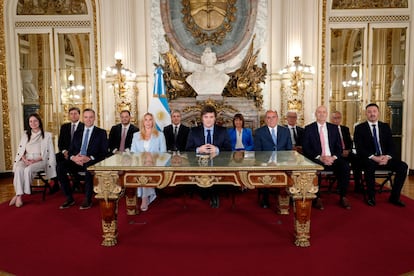Javier Milei: ‘You already know the chainsaw, now the deep chainsaw is coming’
The Argentine president celebrated his first year in office with a recorded speech broadcast on radio and television


Javier Milei promised Argentines more chainsaws on Monday. “The deep chainsaw is coming,” he warned by way of celebration of his first year in office. It will involve “dismantling geological layers of statism” with the elimination of public agencies, secretariats, and undersecretariats. “The smaller the state, the more freedom there is,” insisted Milei in a speech read out from the Casa Rosada and ordered to be broadcast on radio and television. Flanked by all his ministers, but without his vice president Victoria Villarruel ― with whom he is no longer on speaking terms ― the far-right leader declared “the end of the recession” and promised that next year he will eliminate “90% of all taxes.” With his early idea of dollarizing the economy now definitively shelved, in 2025 there will be, he said, “a scheme of currency competition” that will allow “every Argentine to buy and sell in dollars or in the currency they want.”
The president started the day with a visit to the Sociedad Rural Argentina, which represents the large livestock raisers of the pampas region. He wanted to commemorate his 12 months in office with the nation’s main rural producers, to whom he promised a reduction in export taxes, an old demand of the sector. In the afternoon, he secluded himself in the Casa Rosada to record his speech. He sat in the White Room, used for major ceremonial events, and read the speech almost without looking at the camera. He listed the economic achievements of his administration, such as the reduction of inflation and the fiscal surplus, the dismissal of 35,000 public employees, the closure of ministries, the reduction of Argentina’s credit risk and “zero monetary emission.” He then asked to concentrate on the future where, he said, “happy times” await Argentines. “I can tell you that we have overcome the test of fire, the recession is over and the country has begun to grow. We have emerged from the desert. This means that we can end the year with relief and that we have left the worst behind. It is conditional on safeguarding what we have achieved,” he said, thinking ahead to the legislative elections in October.
The campaign agenda warranted a special mention from Milei. He said that “for the first time in history” there will not be “an expansive monetary and fiscal policy” during the campaign, a classic strategy of governments that want to win elections. “We are not going to fall into this temptation that seduced the caste; we are going to continue with our adjustment plan, with a tax, labor, penal and political reform. It will be a choice between the stale politicians of the past and an agenda of the future,” he said. And, without saying it openly, he asked for the vote for the candidates of La Libertad Avanza (Freedom advances), his party in formation. “If we could do so much with everyone against us, imagine what we can do with the wind in our favor. We could go twice as far and twice as fast,” he noted.
Milei was careful this time to avoid insults. He did mention the “degenerate prosecutors,” but avoided the list of vulgarities that he usually launches against those he considers his enemies. Although he referred to “the forces of heaven” that, he says, drive his quest against the left, he did not close his speech with his traditional “long live freedom, damn it,” the battle cry of Argentina’s far right. “The time of the common man has passed, that is why we are cutting down public spending with a chainsaw,” he said.
Last Friday, Milei participated in Montevideo at the summit of the presidents of Mercosur, the commercial bloc that Argentina is part of along with Brazil, Uruguay, Paraguay and, since this year, Bolivia. This Tuesday, he repeated what he said in front of his peers: his government will work to “increase the autonomy of the members so that they can trade with whoever they want” without having to ask permission from their partners. The final objective, he said, is “to promote a free trade agreement with the United States, an agreement that should have been signed 19 years ago,” in reference to the failed continental alliance, the FTAA, which was promoted by President George W. Bush. “Growth was taken from us with the signature of a group of bureaucrats who refused to trade,” said Milei, recalling the Summit of the Americas in November 2005 that then-Venezuelan leader Hugo Chávez closed with cries of “Al carajo”(”to hell with it”).
Finally, Milei had words about “the caste.” “We have brought results and there is nothing you can do to prevent it. You can get on the train of progress or be run over by it,” he told his opponents. He asked his followers to “plan big for next year” because there will be “the forces of heaven” to defend them “tooth and nail.”
Sign up for our weekly newsletter to get more English-language news coverage from EL PAÍS USA Edition
Tu suscripción se está usando en otro dispositivo
¿Quieres añadir otro usuario a tu suscripción?
Si continúas leyendo en este dispositivo, no se podrá leer en el otro.
FlechaTu suscripción se está usando en otro dispositivo y solo puedes acceder a EL PAÍS desde un dispositivo a la vez.
Si quieres compartir tu cuenta, cambia tu suscripción a la modalidad Premium, así podrás añadir otro usuario. Cada uno accederá con su propia cuenta de email, lo que os permitirá personalizar vuestra experiencia en EL PAÍS.
¿Tienes una suscripción de empresa? Accede aquí para contratar más cuentas.
En el caso de no saber quién está usando tu cuenta, te recomendamos cambiar tu contraseña aquí.
Si decides continuar compartiendo tu cuenta, este mensaje se mostrará en tu dispositivo y en el de la otra persona que está usando tu cuenta de forma indefinida, afectando a tu experiencia de lectura. Puedes consultar aquí los términos y condiciones de la suscripción digital.








































